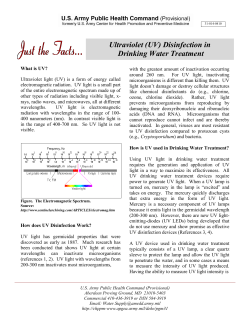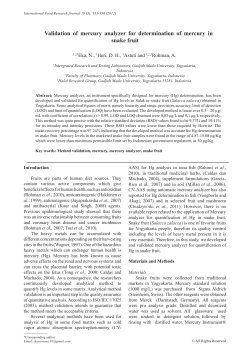
INTERLABORATORY STUDY NAPHTHA iis06N01 2006
INTERLABORATORY STUDY NAPHTHA iis06N01 2006 Report form A for analysis results sample 0620 Report to: R.J. Starink/ E. van der Burg before April 28, 2006 fax. + 31 181 69 45 43 Determination Unit Preferred method (**) Colour (Saybolt) D156 Copper Corrosion 3hrs@50°C D130 Unrounded Actual result 0620 method used (**) Density at 15 °C Kg/L Distillation Automated or Manual ? * i.b.p. °C D86 * 50% recovered °C D86 * f.b.p. °C D86 mg/kg D3227 Sulphur mg/kg *) please circle correct option D2622 Mercaptans result 0620 rounded cfr. used standard D4052 A / M *) **) See Instructions Name of laboratory: date of sample receipt: Country: Name of responsible manager: date of report: INTERLABORATORY STUDY NAPHTHA iis06N01 2006 Report form B for analysis results of sample 0621 Report to: R.J. Starink/ E. van der Burg before April 28, 2006 fax. + 31 181 69 45 43 Determination Unit Preferred method (**) Organic chlorides as Cl mg/kg D5808 Methanol mg/kg MTBE mg/kg Unrounded Actual result 0621 method used (**) result 0621 rounded cfr. used standard PONA / PIONA / PNA n-paraffines vol% D5443 i-paraffines vol% D5443 olefines vol% naphthenes vol% D5443 aromatics vol% D5443 C4 and lighter hydrocarbons vol% D5443 Compounds with bp >200°C vol% n-paraffines Wt% D5443 i-paraffines Wt% D5443 Olefines Wt% Naphthenes Wt% D5443 aromatics Wt% D5443 C4 and lighter hydrocarbons Wt% D5443 Compounds with bp >200°C Wt% Metals Lead content as Pb µg/kg IP224 === LOW Mercury content (0 – 15 µg/kg) Mercury content as Hg µg/kg (**) See Instructions Name of laboratory: date of sample receipt: Country: Name of responsible manager: date of report: INTERLABORATORY STUDY NAPHTHA iis06N01 2006 Report form C for analysis results of sample 0622 and 0623 ONLY for MERCURY as Hg Report to: R.J. Starink/ E. van der Burg before April 28, 2006 fax. + 31 181 69 45 43 Determination Mercury Determination Unit µg/kg Determination unit * Mercury as Hg (**) see instructions Unrounded Actual result 0622 method used (**) result 0622 rounded cfr. used standard = = = = Medium content (15 – 150 µg/kg) = = = = * Mercury as Hg Mercury Determination Preferred method (**) Preferred method (**) Unrounded Actual result 0623 method used (**) result 0623 rounded cfr. used standard = = = = High content (150 – 500 µg/kg) = = = = µg/kg Short description of the method used: (how much sample used, sample treatments, destruction, etc.): How was the mercury detected and quantified (Hydride, ICP, other): What calibration was used (e.g. external standard, internal standard): Were analytical results corrected for recovery (Yes/No): Remarks: Name of laboratory: date of sample receipt: Country: Name of responsible manager: date of report: Instructions to participants for the interlaboratory study Naphtha iis06N01 * Please confirm samples receipt as soon as you have received this package, preferably using the fax form that you receive together with this package. Please complete the form and fax it to I.I.S (faxno. ++ 31 181 69 45 43) If bottles have been broken please do not accept the package from the courier. New samples are on account of the courier. When the bottles have been leaking please report this on the fax form. * This interlaboratory study concerns 4 different samples of Naphtha (500 mL of sample 0620, 500 mL of sample 0621, 100 ml of sample 0622 and 100 ml of sample 0623). Please treat the samples as if they were routine samples. On 3 samples Mercury (Hg) is requested #0621 = low, #0622 = medium, #0623 = high content. * Each laboratory is requested to analyse the sample(s) in the way it would normally do in day-to-day circumstances. Furthermore, each laboratory is advised to perform only those analyses you routinely do (but you are allowed to do all analysis if you like). It might be wise to start with those tests which are most important to your laboratory, especially if the supplied sample amount seems to be critical for you lab. * Report the analytical results using the indicated units on the report form. Report in the last column the analytical results, rounded in accordance with the standard method that was used. Report in the first result column the same analytical results but less rounded (we suggest to report one extra significant figure) in order to give more meaningful statistical calculations. For example, when you use ASTM D4052 for the determination of Density and you found a result of 0.75285 kg/L, we request you to report 0.7529 kg/l in accordance with ASTM D4052 and 0.75285 kg/L as ‘unrounded’ result. * On report form A, B and C an extra column is added on request of several participants. This column is named: ”preferred method”. In this column the method is mentioned, which the Institute for Interlaboratory Studies will use for calculating the z-scores. It is of utmost importance to know that the method, which is mentioned, is NOT mandatory. So when you normally use in day-to-day circumstances an other method than the method prescribed in the ”preferred method” column, please use your method and note the actual used method in the ”actual method used” column * Report also the method used on the report form. If no Standard method is used, report 'in house' method or report the official method on which it is based with the remark 'mod' (modified). * Return the completed report form(s) to the Institute for Interlaboratory Studies at Spijkenisse, The Netherlands, preferably one week after sample receipt, but in any case before the indicated closing date: April 28, 2006 (preferably by fax). * If you have any remarks/questions please contact: ing. R.J. Starink/ E. van der Burg, Institute for Interlaboratory Studies p.o. box 200, NL-3200 AE Spijkenisse, The Netherlands tel.no. ++ 31 181 69 45 41 faxno. ++ 31 181 69 45 43 email: iisnl@sgs.com
© Copyright 2025












